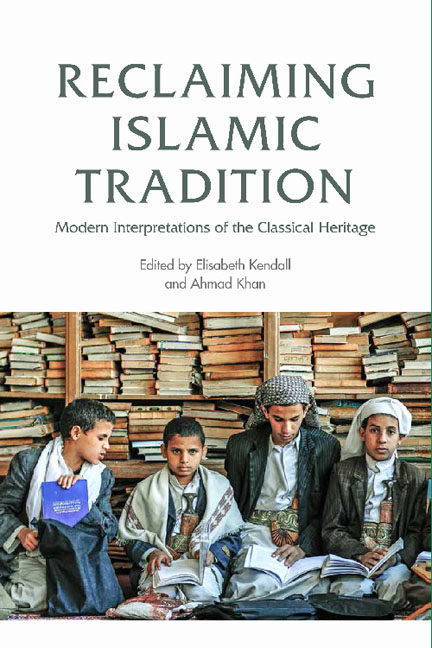Book contents
- Frontmatter
- Contents
- Acknowledgements
- About the Contributors
- Introduction
- 1 Modern Shiʿite Legal Theory and the Classical Tradition
- 2 Muḥammad Nāṣīr al-Dīn al-Albānī and Traditional Hadith Criticism
- 3 Islamic Tradition in an Age of Print: Editing, Printing and Publishing the Classical Heritage
- 4 Reaching into the Obscure Past: The Islamic Legal Heritage and Reform in the Modern Period
- 5 Reading Sūrat al-Anʿām with Muḥammad Rashīd Riḍā and Sayyid Quṣb
- 6 Contemporary Iranian Interpretations of the Qurʾan and Tradition on Women’s Testimony
- 7 Ibn Taymiyya Between Moderation and Radicalism
- 8 The Impact of a Sixteenth-Century Jihad Treatise on Colonial and Modern India
- 9 Jihadist Propaganda and its Exploitation of the Arab Poetic Tradition
- 10 Contemporary Salafi Literature on Paradise and Hell: The Case of ʿUmar Sulaymān al-Ashqar
- Index
2 - Muḥammad Nāṣīr al-Dīn al-Albānī and Traditional Hadith Criticism
Published online by Cambridge University Press: 11 November 2020
- Frontmatter
- Contents
- Acknowledgements
- About the Contributors
- Introduction
- 1 Modern Shiʿite Legal Theory and the Classical Tradition
- 2 Muḥammad Nāṣīr al-Dīn al-Albānī and Traditional Hadith Criticism
- 3 Islamic Tradition in an Age of Print: Editing, Printing and Publishing the Classical Heritage
- 4 Reaching into the Obscure Past: The Islamic Legal Heritage and Reform in the Modern Period
- 5 Reading Sūrat al-Anʿām with Muḥammad Rashīd Riḍā and Sayyid Quṣb
- 6 Contemporary Iranian Interpretations of the Qurʾan and Tradition on Women’s Testimony
- 7 Ibn Taymiyya Between Moderation and Radicalism
- 8 The Impact of a Sixteenth-Century Jihad Treatise on Colonial and Modern India
- 9 Jihadist Propaganda and its Exploitation of the Arab Poetic Tradition
- 10 Contemporary Salafi Literature on Paradise and Hell: The Case of ʿUmar Sulaymān al-Ashqar
- Index
Summary
Muḥammad Nāṣir al-Dīn al-Albānī was a prolific and influential Salafi writer. He was born in Albania in 1914. His family emigrated to Damascus, where he grew up to be a tradesman and an informally-trained ʿālim, expert in hadith and Ḥanafī law. He taught in Saudi Arabia 1961–3, having to leave because of aberrant legal opinions; for example, that it was unnecessary to fast in Ramadan if one could not see daylight, as in a house with the windows blocked; that it was unnecessary to remove one's footwear to pray; and that the full-face veil was unnecessary. He was invited back to Mecca for a brief period in the 1970s but spent most of the rest of his life in Jordan. He died in Amman in 1999.
To me as a student of hadith, he is interesting first of all for his fearless criticism of the traditional canon. What first caught my eye were things like Ṣaḥīḥ Sunan Ibn Māja (1986), followed two years later by Ḍaʿīf Sunan Ibn Māja (1988), the sound and the weak of Ibn Māja (d. 887?), one of the Six Books, the most prestigious Sunni collections of hadith (although admittedly Ibn Māja's was the last to be added to the list and never enjoyed the same prestige as the rest). These were shortly followed by similar volumes identifying the strong and weak of the collections of Tirmidhī (d. 892?) and Nasāʾī (d. 915?), two others of the Six Books (and both less obvious targets). The earliest book of his that I have come across is Ḥijāb al-marʾa al-muslima, dated on the cover 1374/1954–5, completed according to a note at the end in Damascus, 7/5/1371; that is, 3 February 1952. Its bibliography seems to indicate an earlier publication (probably no more than a pamphlet), Takhrīj aḥādīth kitābi-hi Ṣifat ṣalāt al-nabī, I take it as an extract from the Sunan of Abū Dāwūd with commentary. Already at this point, he seems to have projected an abridgement of one of the Six Books comprising only its sound hadith.
- Type
- Chapter
- Information
- Reclaiming Islamic TraditionModern Interpretations of the Classical Heritage, pp. 33 - 51Publisher: Edinburgh University PressPrint publication year: 2018



